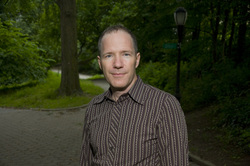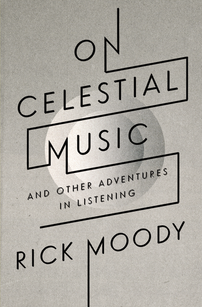 Rick Moody Photo by Thatcher Keats Rick Moody's acclaimed and prizewinning books include the novels Garden State, The Ice Storm, Purple America, The Diviners and The Four Fingers of Death. He has received the PEN/Martha Albrand Award, the Addison Metcalf Award from the American Academy of Arts and Letters, the Paris Review’s Aga Khan Prize, and a Guggenheim Fellowship. He lives in Brooklyn. RUSTY TALK WITH RICK MOODY Kathryn Mockler: What is your first memory of writing creatively? Rick Moody: As opposed to writing non-creatively? I remember attempting to start a novel in 6th grade. Didn't get very far. And there was a poem, in 7th grade, with the same syllabification and rhyme scheme as "Jabberwocky." (Lewis Carroll had just struck a chord with me.) I'm sure there were earlier examples of "creative writing," but I'm not always sure I know what that means. In some ways, all early writing is creative. It's precisely education that teaches us how NOT to write creatively. KM: Why did you become a writer? RM: I got fired from a lot of other jobs. KM: Could you describe your writing process? RM: How I have worked varies from project to project and from decade to decade. Right now, my process is: wait for the semester to end, then write like a maniac, as many hours of the day as are physically possible, bearing in mind the occasional social obligation or need to interact with my daughter. Otherwise: eat and sleep writing and writing-related projects. I don't do it in the same places all the time. I don't do it in the same way from day to day. So there is no science. Be alert to the possibility of language. Follow the language. And revise as much as you can until someone shouts at you that they need the assignment. KM: Rejection or criticism can often stop new writers before they start. Do you have any advice on how to deal with rejection? RM: Always be working on the next thing. KM: What writers would you recommended to an aspiring writer? Or what writers were influential to you when you first started out? RM: Melville Hawthorne Thoreau Joyce Beckett Wolff Faulkner Nabokov Paley Gaddis Barthelme KM: What is the best literary advice you've gotten that you actually use? RM: The only important part is the work. Pay no attention to any part but the work. If you can be content with that part of the job, you will never be disappointed. KM: What are you working on now? RM: A new novel, some stories, a few more essays on music, a poem, and so on.  RICK MOODY'S MOST RECENT BOOK On Celestial Music and Other Adventures in Listening, Hachette Book Group, 2012 Description from Hachette Book Group Rick Moody has been writing about music as long as he has been writing, and this book provides an ample selection from that output. His anatomy of the word cool reminds us that, in the postwar 40s, it was infused with the feeling of jazz music but is now merely a synonym for neat. "On Celestial Music," which was included in Best American Essays, 2008, begins with a lament for the loss in recent music of the vulnerability expressed by Otis Redding's masterpiece, "Try a Little Tenderness;" moves on to Moody's infatuation with the ecstatic music of the Velvet Underground; and ends with an appreciation of Arvo Part and Purcell, close as they are to nature, "the music of the spheres." Contemporary groups covered include Magnetic Fields (their love songs), Wilco (the band's and Jeff Tweedy's evolution), Danielson Famile (an evangelical rock band), The Pogues (Shane McGowan's problems with addiction), The Lounge Lizards (John Lurie's brilliance), and Meredith Monk, who once recorded a song inspired by Rick Moody's story "Boys." Always both incisive and personable, these pieces inspire us to dive as deeply into the music that enhances our lives as Moody has done--and introduces us to wonderful sounds we may not know. Read an excerpt of On Celestial Music and Other Adventures in Listening. Comments are closed.
|
Rusty Talk
Rusty Talk Editor: Archives
November 2017
Categories
All
|

 RSS Feed
RSS Feed
